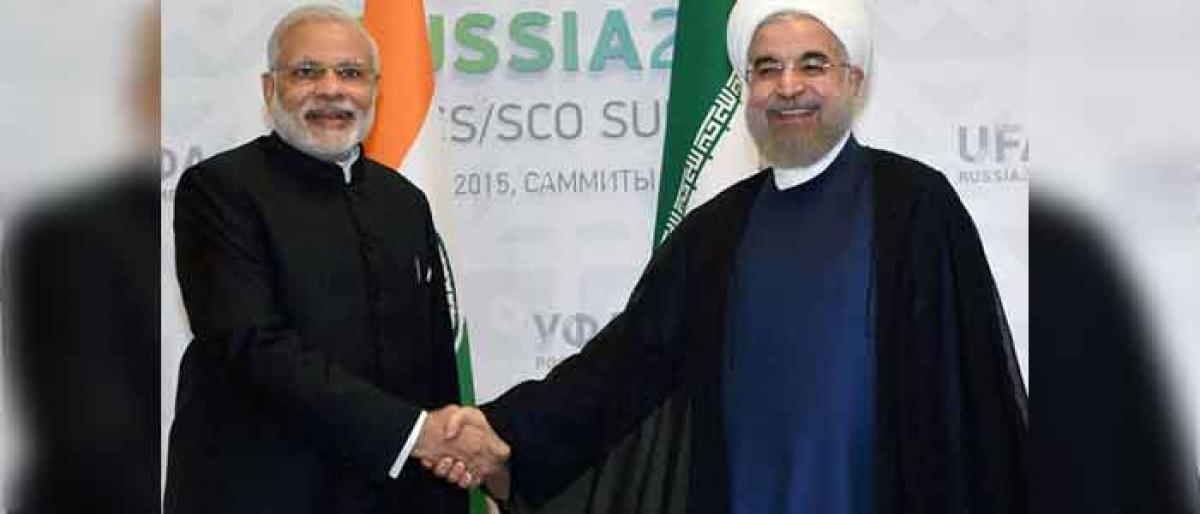Live
- They always want me to win, and now I feel lucky to have been offered a story like ‘Zebra’: Satyadev Kancharana
- ‘Democracy first, humanity first’: PM Modi in Guyana's parliament on two countries' similarities
- PKL Season 11: Telugu Titans register third straight win to top standings
- Is Pollution Contributing to Your COPD?
- NASA Unveils Underwater Robots for Exploring Jupiter's Moons
- Additional Central forces arrive in violence-hit Manipur
- AR Rahman and Saira Banu’s Divorce: Legal Insights into Common Issues in Bollywood Marriages
- 82.7 pc work completed in HPCL Rajasthan Refinery area: official
- Curfew relaxation extended in 5 Manipur districts on Friday
- Tab scam prompts Bengal govt to adopt caution over fund disbursement
Just In

Iran and India signed nine agreements, including one on the leasing part of the Iranian port of Chabahar to an Indian company, after bilateral talks between the Indian Prime Minister and the Iranian President in New Delhi the other day. The visit itself came at a sensitive time for Iran and presented New Delhi with an opportunity.
Iran and India signed nine agreements, including one on the leasing part of the Iranian port of Chabahar to an Indian company, after bilateral talks between the Indian Prime Minister and the Iranian President in New Delhi the other day. The visit itself came at a sensitive time for Iran and presented New Delhi with an opportunity.
It should be noted that this agreement follows a slowdown in the relations between the two under the shadow of the US and the EU sanctions. The first Presidential visit from Iran since 2003 comes at a complicated moment in Tehran. For the Islamic Republic of Iran, it is the best of times and also the worst of times.
In fact, Iran President Hasan Rouhani's visit to India on the heels of Prime Minister Narendra Modi's visit to Tehran in 2016 represented a continuation of India's robust outreach to West Asia. It was also interesting to note that this visit followed Modi government's much-celebrated engagement with one of Iran's biggest enemies in the region, Israel and Netanyahu's grand visit.
In addition, Rouhani's trip came at a time when Israel has marked the presence and advances of Tehran-backed Shiite militias on its borders with Syria and commenced a military campaign against them. Last week, Syrian SAM systems shot down an Israeli F-16 conducting a strike against these Shiite militias.
It must be noted that this front is one of region's most dangerous and fragile one. Yet India's relations with Iran have remained generally stable in recent years, notwithstanding hiccups during the period of peak sanctions against Tehran by the US administration. In addition, Rouhani's visit came close on the heels of an extremely productive four nation tour undertaken by Modi to West Asia where he visited Palestine (the first by an Indian PM), Oman, UAE and Jordan.
The last one was during transit any way. The King of Jordan and Saudi Arabia are likely to visit India in the coming months. India is, perhaps, one country that has warmed up to the few countries on all sides of the divide in West Asia, including the Shia and Sunni split and the Iran and Israeli conflict. On his part, Rouhani also undertook the visit amid his own worries and concerns. He is fighting a battle against the conservatives while dealing with the economic slowdown on the other, and is trying to save the nuclear deal from the Trump administration.
There is a renewed risk of international isolation via sanctions. India signed some key pacts with Iran including the one on avoidance of double taxation and another for leasing by an Indian company of a container terminal facility in Iran's Chabahar port. While no announcement was made on the Farzad-B gas field that India was interested in, the joint statement indicated that positive deliberations would follow on this count.
Iran, the third largest crude supplier to India, seeks economic cooperation. India needs access to the Chabahar port as it is crucial to bypass Pakistan and open the way for broader connectivity to Central Asia. Rouhani's visit is a win-win game for both.

© 2024 Hyderabad Media House Limited/The Hans India. All rights reserved. Powered by hocalwire.com







